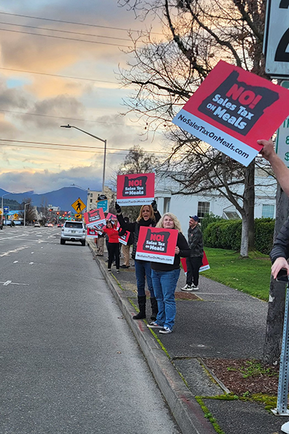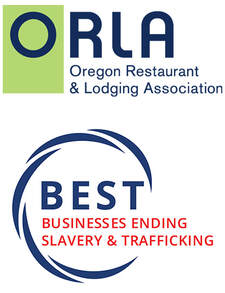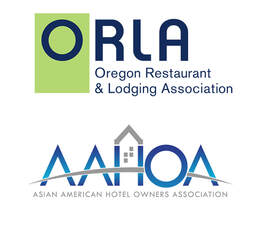Unfair, Subjective “Smell” Standard Being Enforced by City of Portland Needs to End Immediately2/27/2024
FOR IMMEDIATE RELEASE: February 27, 2024 Contact: Greg Astley, Director of Government Affairs, ORLA | 971.224.1502 (Portland, OR) – The Oregon Restaurant & Lodging Association (ORLA) is demanding the City of Portland review its subjective, unfair “smell” code immediately and cease targeting small restaurants and their owners, many of whom are people from various racial and ethnic backgrounds. “It’s come to our attention the City of Portland is issuing citations to certain restaurants for ‘smells’ based on anonymous complaints,” said ORLA President & CEO Jason Brandt. “For other code violations, such as noise, vibration and even glare, there are measurable, objective standards but surprisingly, the City’s code written for ‘odor’ violations is entirely subjective.” According to the zoning code (33.262.070), “The odor threshold is the point at which an odor may just be detected” by an inspector’s nose. No equipment of any kind is required. A recent complaint by an anonymous neighbor has resulted in at least one Portland restaurant closing its doors. As reported by Willamette Week, Pho Gabo Vietnam Kitchen recently had to shut down operations because one neighbor has repeatedly complained they “can’t stand the smell of the grill and the meat.” “It’s unbelievable that an anonymous person’s repeated complaints about an odor can shut down an entire restaurant, potentially displacing its workers and causing the operator irreparable financial harm,” continued Brandt. “There are a number of factors that contribute to Portland’s air quality (and livability) but forcing restaurants out of business does not seem like the most constructive way to address the problem.” Suggested solutions from the City of Portland, including installing scrubbers to prevent the odors from traveling outside the restaurant are extremely expensive and at best, would only mitigate the smells, not eliminate them. ORLA is calling for the City of Portland to immediately cease these unfair and subjective citations and review its policies on code violations. For more information on ORLA’s advocacy efforts in Portland, read the Advocacy Blog at OregonRLA.org/portlandblog. About ORLA
The Oregon Restaurant & Lodging Association is the leading business association for the foodservice and lodging industry in Oregon, which is comprised of over 10,220 foodservice locations and 2,000 lodging establishments. As of December 2023, the Oregon Employment Department reports the Leisure and Hospitality workforce totals 208,700 with a total economic impact of over $13.8 billion in annual sales for Oregon.  Meals Tax Goes Down at Council, Will Likely Move to Ballot Last night the Grants Pass City Council voted 5-3 in opposition of adopting the ordinance at Council level for a food and beverage tax, flipping their previous vote earlier this month. Restaurant operators showed up in droves with signs and buttons as well as to testify alongside ORLA and its members, clearly demonstrating how our industry is well organized and willing to do what it takes to protect our businesses. Despite the Council voting against enacting the tax, they may decide to place it on the ballot in November for voters to decide. Council Considered General Sales Tax, Utility Fee, and Meals Tax The City of Grants Pass is looking for funding sources to increase service levels of public safety. A general sales tax, a prepared meals tax on restaurants, and a utility fee were all being considered. And on February 7, City Council voted 5-3 to pursue a 3% meals tax in addition to a utility fee. Grants Pass’ city charter allows Council to legally pass this tax without the vote of the people, though it is very uncommon for new taxes to be passed without a ballot vote. Based on draft language for the new food and beverage tax ordinance, increases in the 3% tax would be allowed at any time and to any amount without the vote of the people. We strongly feel the Council’s decision to place the burden of paying for services everyone will benefit from on a single industry segment is inequitable and dangerous. Brief History:
ORLA has outlined several reasons why voters should be allowed to weigh in on a sales tax on meals:
At the very least, the people of Grants Pass deserve to vote up or down on this sales tax on meals. An even better solution for the City would be to consider an Economic Improvement District or similar mechanism where the burden of raising revenue falls more broadly than on just the struggling local restaurants. If you have any questions or want to get engaged in this issue, reach out to ORLA Regional Representative, Terry Hopkins. ORLA is a trade organization for the foodservice and lodging industry in Oregon, formed for the purposes of promoting the common business interests of its membership and to improve business conditions of the foodservice and lodging industry. If you are not currently a member of ORLA and would like to learn more, visit our Membership page and reach out to us via email.
Restaurants and Lodging Facilities Across Oregon Get a New Tool to Help Stop Human Trafficking2/21/2024
 FOR IMMEDIATE RELEASE MEDIA CONTACTS: Jason Brandt, Oregon Restaurant & Lodging Association, 503-302-5060 Katie Amodei, Businesses Ending Slavery & Trafficking, 425-280-3347 Wilsonville, OR—The Oregon Restaurant & Lodging Association (ORLA) today announced a new partnership with the nonprofit, Businesses Ending Slavery and Trafficking (BEST) to make human trafficking awareness training available to all ORLA members and their staffs, free of charge. BEST provides specialized training in human trafficking prevention, and BEST’s Inhospitable to Human Trafficking training for the hospitality industry will now be available to help restaurant and lodging employees across Oregon learn the indicators of human trafficking and how to safely report it. This new partnership is giving the hospitality industry in Oregon a new tool that has been proven to prepare employees to be able to recognize human trafficking situations and assist in recovering more victims. “ORLA needs to be a leader in forging stronger working relationships with like minded organizations focused on anti-trafficking training,” said Jason Brandt, President & CEO for the Oregon Restaurant & Lodging Association. “Our industry is a part of the solution and needs to be at the table in providing quality training at no cost as a foundational societal responsibility.” Human trafficking networks rely on legitimate businesses to sustain their operations and infrastructure, and hospitality businesses are often an ideal environment for human traffickers because they provide a public place of business where traffickers can connect victims with buyers and other exploiters. In 2021 the National Human Trafficking Hotline was contacted 485 times to report suspected human trafficking incidents in Oregon. The intention of this new partnership is to have even more human trafficking cases identified and reported across the state by educating public facing hospitality employees to be able to recognize and report the behaviors that are the indicators of human trafficking. Oregon is home to several port authorities and interstate freeways, and this makes the state a prime location for human trafficking activity. In a recent national FBI-led anti-trafficking operation that was conducted in the summer of 2023, Oregon was one of the states where traffickers were identified and arrested in a sting operation that led to the identification or arrest of a total of 126 suspects and to the recovery of 59 victims of child sex trafficking. “There is no easy fix to the complex problem of human trafficking, but combatting this crime starts with having good training,” says Kirsten Foot, CEO & Executive Director for Businesses Ending Slavery and Trafficking. “That’s why our new partnership with ORLA is so important. They are making our human trafficking awareness training easily available to their members, and we know that educating public facing employees about the warning signs of human trafficking can help more witnesses know when to report human trafficking behaviors." BEST’s Inhospitable to Human Trafficking training is a 30-minute, online, video-based training. The training is available in English or Spanish, and it has been proven to increase hospitality employee reporting. Researchers from the University of Washington evaluated BEST's hotel training and found trained employees were more likely to come forward to report human trafficking incidents to their mangers. Researchers also learned that 97 percent of hospitality employee participants believe BEST’s training made their workplace safer. About Oregon Restaurant & Lodging Association (ORLA)
The Oregon Restaurant & Lodging Association is the leading business association for the foodservice and lodging industry in Oregon, which is comprised of over 10,220 foodservice locations and 2,000 lodging establishments. As of December 2023, the Oregon Employment Department reports the Leisure and Hospitality workforce totals 208,700 with a total economic impact of over $13.8 billion in annual sales for Oregon. For more information, visit www.oregonrla.org. About Businesses Ending Slavery and Trafficking (BEST) Businesses Ending Slavery and Trafficking (BEST) is a Seattle-based nonprofit organization with the mission to educate employers to prevent human trafficking and create pathways to employment for survivors. BEST is the first organization in the country dedicated entirely to working with employers to disrupt human trafficking. BEST has provided consultation and training to hundreds of businesses on how to prevent human trafficking. For more information visit www.bestalliance.org.  FOR IMMEDIATE RELEASE: Contact: Jason Brandt, President & CEO, ORLA 503.302.5060 | [email protected] Reforms enacted over 20 years ago require ongoing collaboration with local governments across Oregon Wilsonville, OR– The Oregon Restaurant & Lodging Association (ORLA) and the Asian American Hotel Owners Association (AAHOA) are collaborating to keep a watchful eye on lodging tax spending by local governments across Oregon. Currently, there are over 100 different local lodging taxes in jurisdictions across the state which generate over $220 million in revenue for city and county governments of all shapes and sizes. “The task of staying on top of local lodging tax spending across Oregon is one of our most crucial roles,” said Jason Brandt, President & CEO for the Oregon Restaurant & Lodging Association. “Our friends and joint members at AAHOA are an important national ally. Oregon Asian Americans own 60% of all hotels in the state and as such, AAHOA serves as a critical partner in navigating the various formulas for our industry taxes while monitoring the way in which those dollars are spent in local economies.” Reforms passed in the 2003 Oregon Legislative Session established rules for how local governments can spend industry tax dollars. In short, spending on tourism promotion and tourism-related facilities (defined in state statute) was locked in as a percentage of total lodging tax collections on July 1, 2003. And on July 2, 2003, moving forward, any increase in a local lodging tax rate or establishment of a new lodging tax not already in existence must allocate 70 percent of revenues to tourism promotion and tourism-related facilities with the remaining 30 percent serving as unrestricted revenue for the local government to spend however they see fit. "It is crucial that local municipalities adhere to state laws mandating the appropriate allocation of local tourism tax revenue," said Taran Patel, AAHOA's Northwest Regional Director. "In light of our members' ongoing recovery from the profound effects of the pandemic, there has never been a more pressing imperative for cities to strategically reinvest tourism tax dollars, leveraging them to actively and effectively promote increased tourism." A continual commitment to relationship building with local governments remains a key objective given reforms have now been in place for over 20 years. During that span, cities and counties see ongoing changes in administrator positions and elected official office holders. “The work we do at ORLA and AAHOA in monitoring lodging taxes starts with city staff and elected leader conversations,” said Brandt. “New administrators often come from other states with little to no familiarity about Oregon’s rules relating to lodging tax. The same is true for volunteer elected officials who cannot be expected to be experts on industry specific issues like lodging taxes at the onset of their service. We’re here to partner whenever possible and determine ways we can grow the pie of revenue overall which benefits both the industry through direct investments in tourism needs while also benefitting the applicable local government by generating more unrestricted tax revenue for city/county budget needs.” For more information on how local lodging taxes must be expended in accordance with Oregon's state law, watch the Oregon Lodging Tax Defined video or visit the Oregon Restaurant & Lodging Association’s website at OregonRLA.org. About ORLA
The Oregon Restaurant & Lodging Association (ORLA) is the leading business association for the foodservice and lodging industry in Oregon, which is comprised of over 10,220 foodservice locations and 2,000 lodging establishments. As of December 2023, the Oregon Employment Department reports the Leisure and Hospitality workforce totals 208,700 with a total economic impact of over $13.8 billion in annual sales for Oregon. About AAHOA AAHOA is the largest hotel owners association in the world, with Member-owned properties representing a significant part of the U.S. economy. AAHOA's 20,000 members own 60% of the hotels in the United States and are responsible for 1.7% of the nation’s GDP. More than one million employees work at AAHOA Member-owned hotels, earning $47 billion annually, and member-owned hotels support 4.2 million U.S. jobs across all sectors of the hospitality industry. AAHOA's mission is to advance and protect the business interests of hotel owners through advocacy, industry leadership, professional development, member benefits, and community engagement.  Guest Blog Insurance underwriters research your business before issuing a quote or renewing coverage. They find clues about your day-to-day operations in customer reviews, social media profiles, and even the image gallery on your website. Since this analysis can affect your insurance rates, you want to make sure your online presence conveys an accurate story. Here’s what underwriters look for and factors you need to think about: If you say you’re a restaurant, but you’re open until 1 a.m., are you really a bar? Suppose you describe your business as a family restaurant where people of all ages bond through great food and conversation. However, on Yelp, several reviews compliment your cocktails and live entertainment. And your Instagram feed features young adults dancing, a flashing disco ball, and a crowded bar. At the very least, you can expect the underwriter to ask questions to classify your business correctly. Maybe you are a family restaurant until 8 p.m. But after that, you cater to a different target audience that wants to drink and party. The latter scenario is more expensive to insure. What kinds of risks are you taking? An insurance company can deny or cancel coverage if they don’t like what they see online. One establishment featured its ice shot glasses on social media. Fun-loving patrons downed the liquor then smashed their ice “glasses” on the floor, creating a slip hazard. At another place, a bartender stood on top of the bar to toast a patron’s birthday. The restaurant added this celebratory picture to their website. Standing on the counter was not a normal activity in this workplace, but the insurance company didn’t know that. They assumed it was part of the business’s culture, and the worker’s comp carrier spoke up. They didn’t want the risk exposure. Do you comply with laws and regulations? Recently, a bar advertised its “happy hour” on social media with a photo showing “$1 beer all day.” Oregon law prohibits promoting happy hours on social media. Additionally, the beer price and event duration posed underwriting concerns since both factors can contribute to over-consumption of alcohol. In this case, the insurer canceled the bar’s entire insurance package. 7 tips for avoiding an adverse underwriting decision In five minutes, an underwriter is sizing up your business by looking at your online presence. They are asking themselves, “Do I even offer insurance to you? If I let you in the door, will I need to charge you more because I perceive you as riskier?” To position your business in the best possible light with underwriters:
The insurance coverage you need depends on the classification of your business. Are you a bagel bakery or a brew pub? What percentage of your revenue comes from alcohol sales — 0%, 20%, 50%, 80%? If there’s a mismatch between the info on your insurance application and online presence, you risk an adverse underwriting decision. Insurers may decline to quote. Or if you already have coverage, you risk claim denials and the potential for policy cancellation. Take the opportunity to shape your story. Submit a letter or video with background information you want the underwriter to consider. Highlight the steps you’ve taken this year to improve your risk profile. Provide context to help insurers understand your online reputation and business vision. | Rob Hoover Rob Hoover of Risk Strategies Fournier Group manages ORLA’s Hospitality Insurance Program (HIP). Contact him to learn more about online reputation and insurance pricing. This guest blog was submitted by Risk Strategies Fournier Group. For more information on guest blog opportunities, contact Marla McColly, Business Development Director, Oregon Restaurant & Lodging Association.
|
Categories
All
Archives
June 2024
|
Membership |
Resources |
Affiliate Partners |
Copyright 2024 Oregon Restaurant & Lodging Association. All Rights Reserved.
8565 SW Salish Lane Suite 120 | Wilsonville, OR 97070-9633 | 503.682.4422 | 800.462.0619 | Contact Us
Site Map | Accessibility | Privacy Policy
8565 SW Salish Lane Suite 120 | Wilsonville, OR 97070-9633 | 503.682.4422 | 800.462.0619 | Contact Us
Site Map | Accessibility | Privacy Policy

 RSS Feed
RSS Feed


